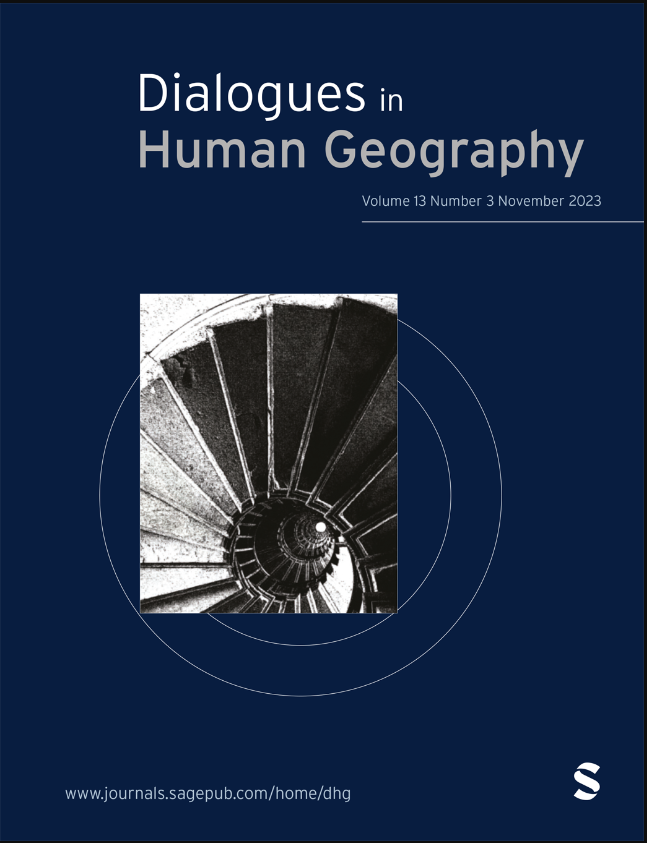依恋的意义:残酷的意图
IF 9.6
1区 社会学
Q1 GEOGRAPHY
引用次数: 0
摘要
在这篇评论中,我论述了以目的论承诺为重点的地理学的一些假设。本-安德森(Ben Anderson)将依恋视为一种具有特殊耐力和意义的关系,将其与可能纠缠在一起的关系区分开来。因此,依恋的力量在于一个人的愿望:它可以把抽象的对象变成近似的对象。我在回应这一概念的两个重点:意义和感性依恋。我重温了安德森以及科凯恩和鲁兹、科尔曼、罗斯和张的后续评论,从劳伦-贝兰特和米歇尔-福柯的共同理论根源中探寻连接组织。我随手引用了分析哲学中关于意义的丰富文献。需要注意的是,哲学和心理学界对 "信念-欲望 "存在着长时间的争论,争论的焦点是,这些情感是否可以单独导致人类行动,或者它们是否需要一个外部对象:如果我们不知道我们想要什么,我们怎么能知道我们想要什么呢?由于篇幅和地理位置所限,我将不讨论这个话题,此外,我也不会在分析哲学和大陆哲学之间架起桥梁;但两者都给 "依恋即场所营造 "带来了方法论上的困难。本文章由计算机程序翻译,如有差异,请以英文原文为准。
The meaning of attachment: Cruel intensions
In this commentary, I address some of the assumptions of a geography focused on teleological promises. Ben Anderson presented attachment as a kind of relation with special endurance and significance, differentiating it from relations which may be entangled. As a result, the power of attachments lies in one's aspirations: they may turn abstract objects into proximal objects. I am responding to two emphases of the concept: on meaning and on sensuous attachment. I revisit Anderson and subsequent commentaries by Cockayne and Ruez, Coleman, Rose and Zhang plumbing their shared theoretical roots in Lauren Berlant and Michel Foucault for connective tissue. I refer casually to the rich literature in analytic philosophy on meaning. Caveat lector that there exists a lengthy debate on ‘belief–desire’ in philosophy and psychology about whether these affects alone may cause human action or if they need an external object: how can we know what we want if we do not know about it? For lack of space and geography, I will not cover this topic, and furthermore I am not bridging the chasm between analytic and continental philosophy; but both present methodological difficulties to attachment-as-placemaking.
求助全文
通过发布文献求助,成功后即可免费获取论文全文。
去求助
来源期刊

Dialogues in Human Geography
GEOGRAPHY-
CiteScore
8.00
自引率
4.00%
发文量
86
期刊介绍:
Dialogues in Human Geography aims to foster open and critical debate on the philosophical, methodological, and pedagogical underpinnings of geographic thought and practice. The journal publishes articles, accompanied by responses, that critique current thinking and practice while charting future directions for geographic thought, empirical research, and pedagogy. Dialogues is theoretically oriented, forward-looking, and seeks to publish original and innovative work that expands the boundaries of geographical theory, practice, and pedagogy through a unique format of open peer commentary. This format encourages engaged dialogue. The journal's scope encompasses the broader agenda of human geography within the context of social sciences, humanities, and environmental sciences, as well as specific ideas, debates, and practices within disciplinary subfields. It is relevant and useful to those interested in all aspects of the discipline.
 求助内容:
求助内容: 应助结果提醒方式:
应助结果提醒方式:


